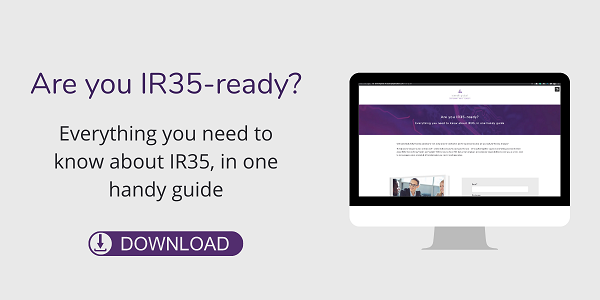You’ve probably heard a lot about IR35 in the last couple of months. The law, also known as the Intermediaries Legislation, originally came into force in 2000, but it’s made headlines recently after the government revealed it would be applied to the private sector from April 2020.
The law is designed to ensure that “people who effectively work as employees pay the right amount of tax”. We’ve written more on the subject here.
A few of our candidates have asked whether we really need IR35 when we already have the Agency Workers Regulations (AWR), which came into force in 2011. The answer, quite simply, is yes. The two are very different beasts and impact on both clients and candidates in very different ways. Here’s how.
1. IR35 focuses on employment relationships
The main purpose of IR35 is to establish a worker’s employment status—whether they are genuinely self-employed or effectively working as an employee—in order to determine tax status. The AWR, on the other hand, seeks to establish whether a worker is an agency worker, and gives agency workers the right to “the same or no less favourable treatment for basic employment and working conditions if they complete a qualifying period of 12 weeks in a particular job”.
2. There’s a difference between “control”, and “supervision and direction”
Employment tests that determine IR35 status include determining whether the hirer has “control” over the work that the contractor does. The AWR includes a clause that requires a contractor to work “under the supervision and direction of a hirer”. It’s these clauses in the two regulations that have led to some confusion. However, it’s possible for a contractor to work under supervision and direction, but without complete control, hence…
3. It’s possible for the AWR to apply to a contractor without IR35
To be covered by the AWR, a contractor must be supplied to a hirer with a third party involved in the arrangements, and work under the direction and supervision of that hirer – thus having agency status. One of the employment tests covered by IR35 is the amount of control exercised over the contractor by the hirer: if just basic direction is given and the contractor has absolute control over the work, IR35 rules may not apply.
4. Equally, it’s possible for IR35 to apply to a contractor without the AWR
This scenario can also work the other way round. Should the relationship between a contractor and a hirer be a direct one, and the hirer exercises full control over the contractor’s work, IR35 regulations will apply. However, because there is no third party involved in this relationship, the contractor will not be entitled to the same rights as an agency worker.
5. Contractors could benefit from AWR exclusion
Employment legislation can be complex, and IR35 is no different: HMRC have already incorrectly taxed thousands of public sector workers they wrongly deemed to fall inside IR35. While receiving the same rights as employees will appeal to many contractors, sitting outside of the AWR may actually help them to prove their tax status. Such exclusion could help to demonstrate that a contractor is in a commercial relationship: Adrian Marlowe of employment law specialist Lawspeed notes that, “Lawspeed sought counsel’s advice on the status of contractors working through personal service companies (PSCs). The opinion supported our view that a PSC is a business undertaking, and the regulations allow individuals carrying on a business undertaking to be excluded. It is important to note that this does not extend to umbrella companies”.
The purposes of IR35 and the AWR are very different, but it’s understandable that hirers and contractors are concerned that benefitting from one could lead to being penalised for the other. Whether you’re an employer or a contractor, the most important thing is to check that all of your contracts and requirements accurately reflect working status and responsibilities, to avoid being caught out when IR35 comes into force in the private sector in 2020.
Whether it’s a contract or permanent role that you’re looking for as your next challenge, we can help. Take a look at our jobs page for the opportunities currently available.

